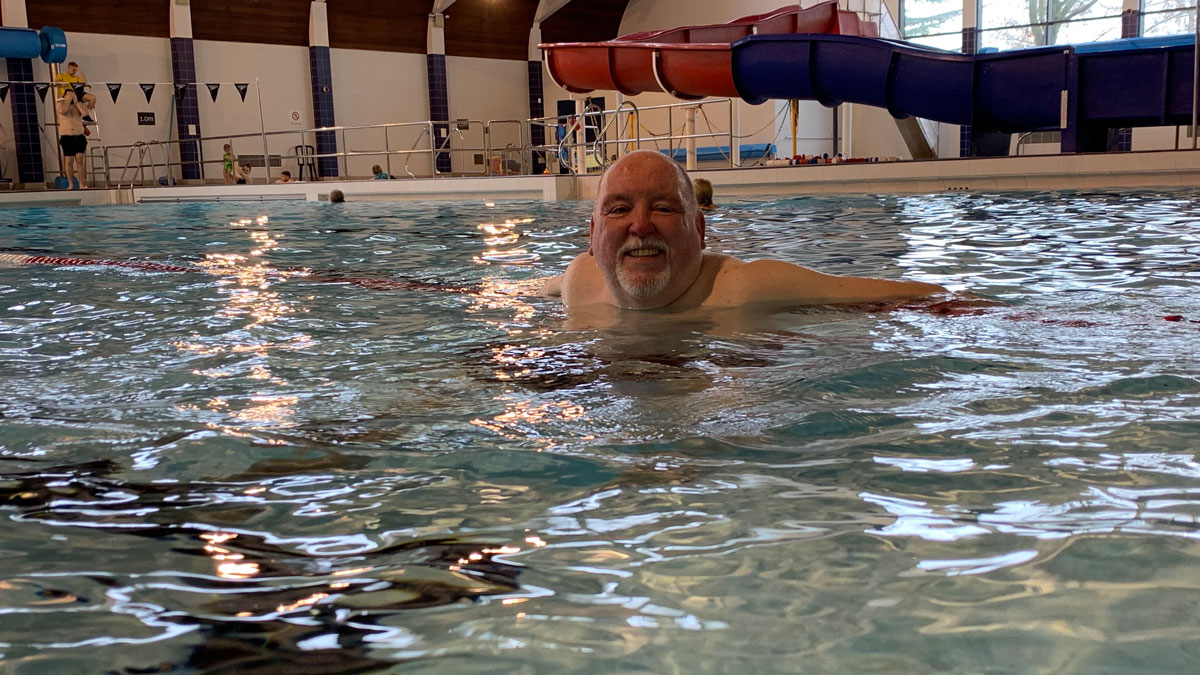
Steve ‘devastated’ after closure of two pools that have helped his recovery
14 September 2023Steve Wright is one of thousands of people who’s health has improved thanks to having regular pool time.
The 66-year-old was diagnosed with type 2 diabetes more than 10 years ago and after suffering a stroke in 2018, a medical professional suggested he gave swimming a try.
Since then, he’s lost more than 40 pounds in weight, feels better mentally and most importantly is able to keep his blood sugars under control.
Now, however, his regular pool time is under threat.
His two local pools in Gateshead have both closed, meaning Steve now has to travel miles just to continue with the activity that has played a ‘massive part’ in his recovery.
And losing the pools close to him is something that Steve is worried could impact on the many health benefits that being in the water gives him and so many others.
He said: “It was really sad [when it closed].”
“I didn’t think it was going to happen, but all of a sudden it did. It was as if it happened overnight, closed barriers and everything. It was sad to see.
“It makes it much more difficult to swim now. I’m lucky enough that I can drive but I’m 66 and swam with a lot of older people and some of them haven’t got a car.
“And the previous pool was right on the doorstep for so many of us, so I think there’ll be a lot of people struggling because of it.
“It’s devastating because it’s a kind of exercise that suits me massively. I did not see myself jogging, walking and doing couch to 5km or anything like that.
“My weight loss has been fairly slow, but it’s a loss every time, every week it goes down and that’s because of swimming.
“It’d be easy for me to say, ‘I’ll just jump in the car and go further’ but I still work and that’s a lot of travelling just to get to the next pool.
“And can you imagine all of a sudden if I went the other way, my blood sugars will start to rise again and I’d start putting weight on.
“Thankfully, my mind is in a better place because of it and I’m not thinking negatively about it, but it might not be easy for some and for others it’s impossible to get to a pool.”
‘I don’t feel 66 anymore, I feel about 45’
The positive effects of getting into the pool are highlighted in Swim England’s new Value of Swimming report.
The findings reveal that regular swimming is associated with a range of health benefits, with 78,500 cases of ill health prevented in 2022 alone.
Diabetes is one of the largest health savings made from swimming, saving the NHS £94,920,452, and Steve is the perfect example of someone with long-term health conditions who has benefitted from time in the water.
“I don’t feel 66 anymore, I feel about 45 because of the impact it’s had on the way I feel,” he added.
“My blood sugars used to run at something like 16 to 20 and now I’m never above seven.
“I had a diabetic review recently and they were doing triple somersaults! But again, it’s because of the pool and what it does.
“At first I was embarrassed to go, but it’s not embarrassing, and once you get in the water people can only see your head and shoulders anyway.
“It’s a type of exercise, which doesn’t take too much out of you, but it does give you so many benefits.
“I’m still obviously losing weight and my diabetes is so much better because I was going in a very wrong direction for some time. So it is down to swimming for me turning that around without doubt.”
Mental benefits
The report also reveals how £35,859,685 is saved as a result of reduced GP and psychotherapy visits by those who swim regularly.
Swim England’s previous reports have also shown that swimming is associated with higher levels of wellbeing when compared to non-swimmers with swimmers feeling happier, more socially connected and less anxious.
And the mental health benefits of swimming and being more active is something that has helped Steve get in to a ‘much better head space’.
He continued: “Swimming in general has made a massive difference to me and my wellbeing, helping me with my condition.
“When you go to the pool the people are lovely and it’s something that takes all your stresses away.
“It’s just a lovely, lovely feeling, and it just puts you in a much better head space.
“All of a sudden you get chatting to other swimmers and you’re in a new social circle and there’s not a problem going to a swimming pool.
“Once you’re in there, it takes all kinds of things away too, you’re just enjoying yourself and you’re not lazy anymore.
“You’re not sitting sluggish, as I feel I can do a lot more. I’m more out and about and not many years ago I would’ve just sat, not worried about it when it was just getting worse.
“And I keep on going back to swimming because that has played a massive part in my recovery and it still is – because I’m not finished yet.”
Click here to find out how you can support Swim England’s ‘Don’t Put a Cap on Swimming’ campaign and you can read the full Value of Swimming report here.
 Swim England
Swim England